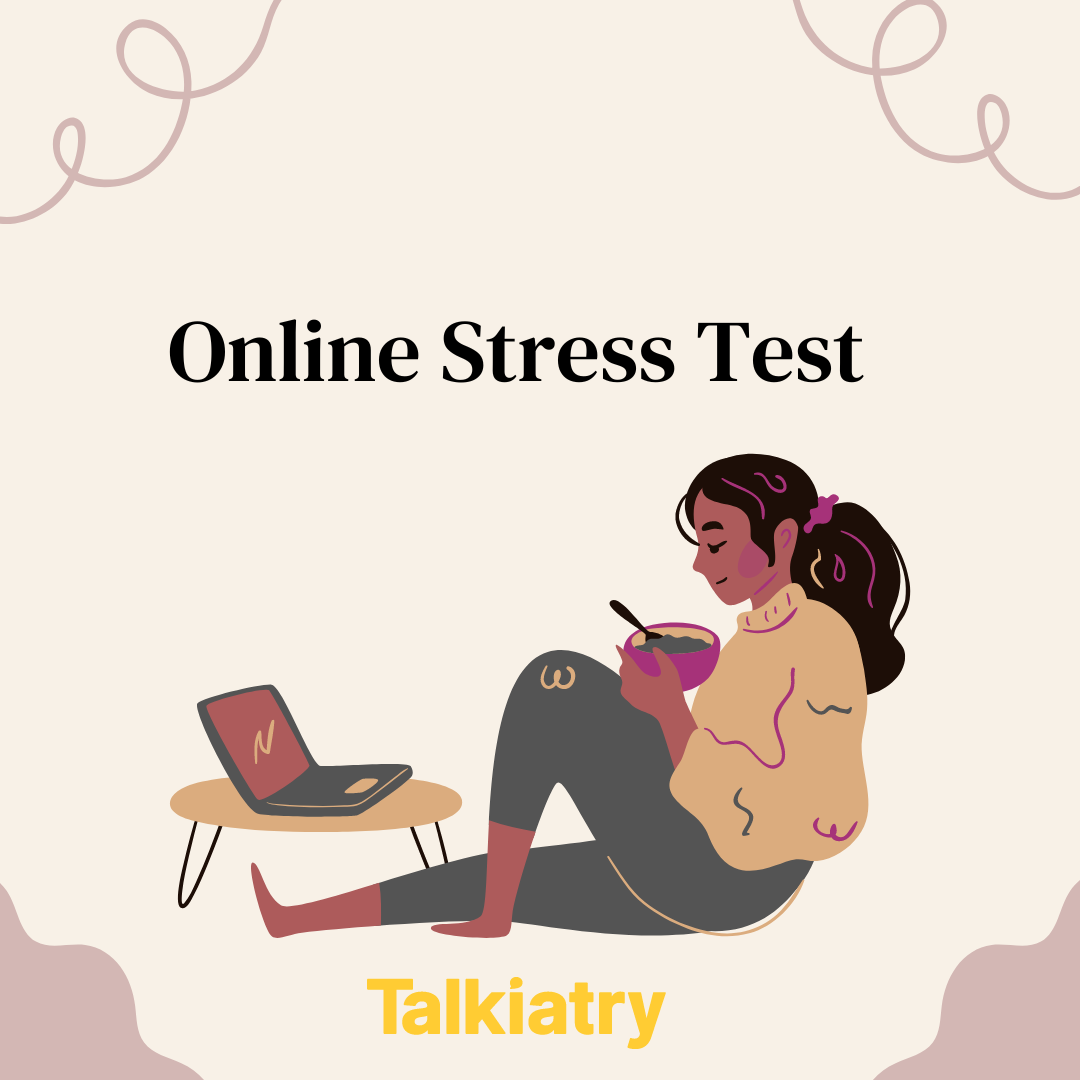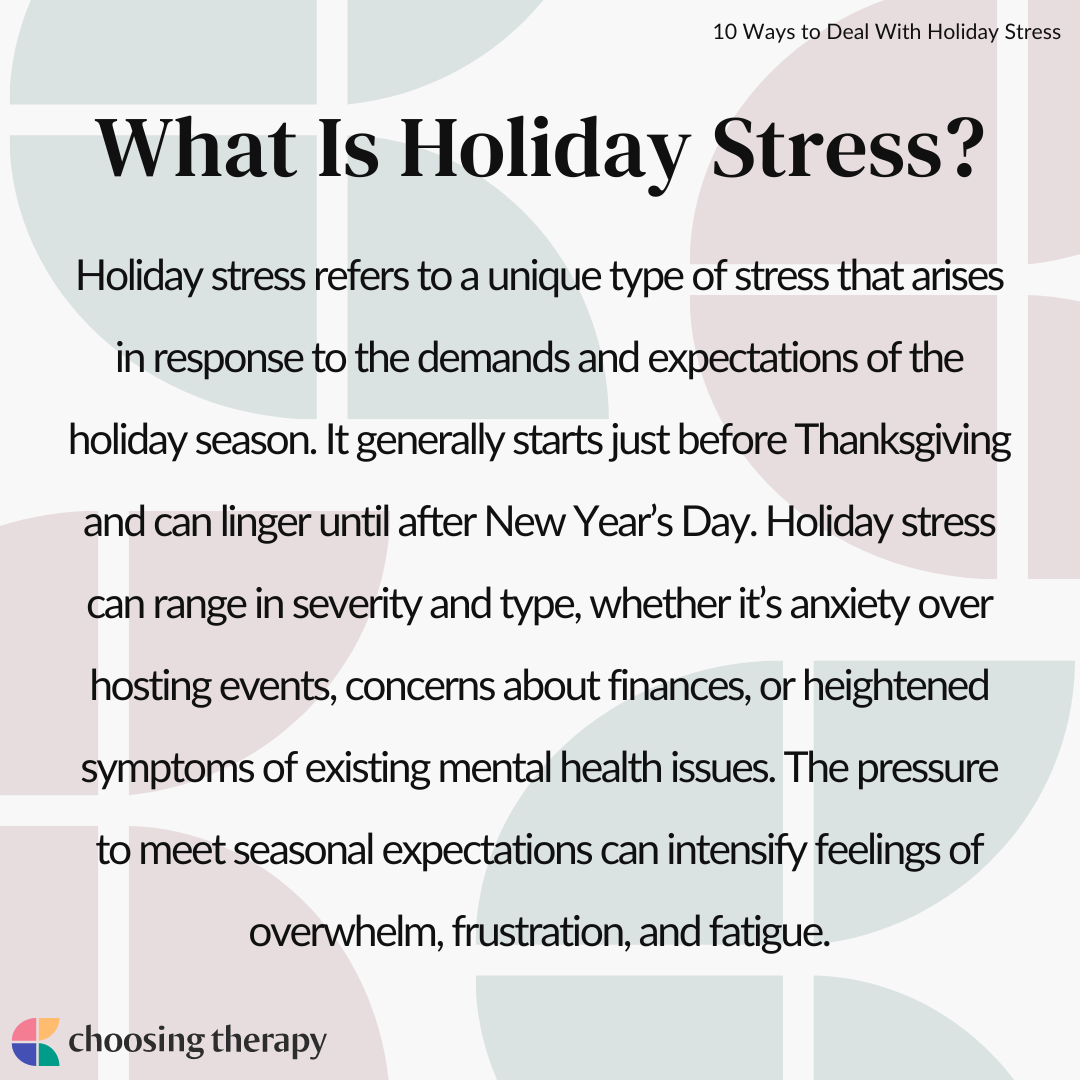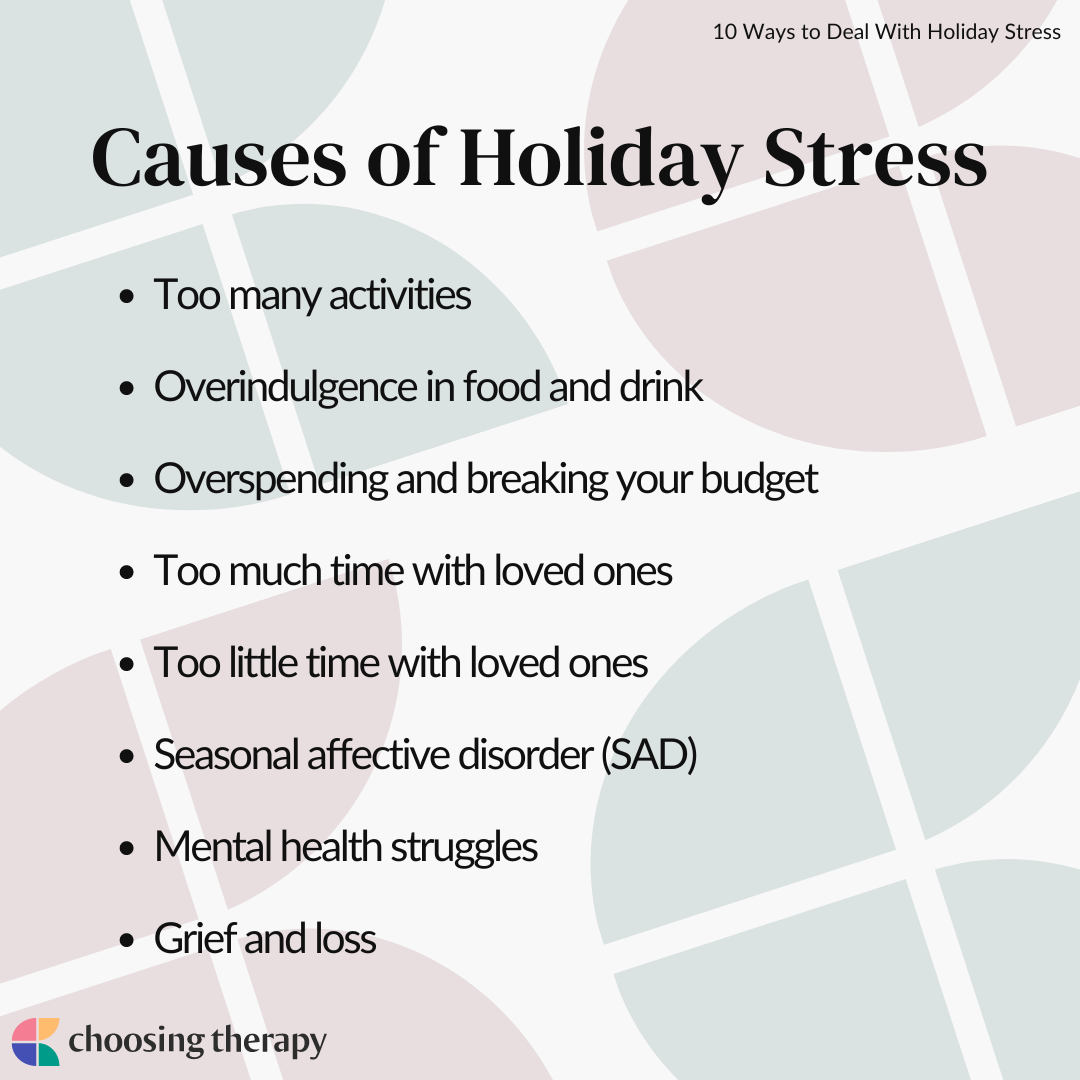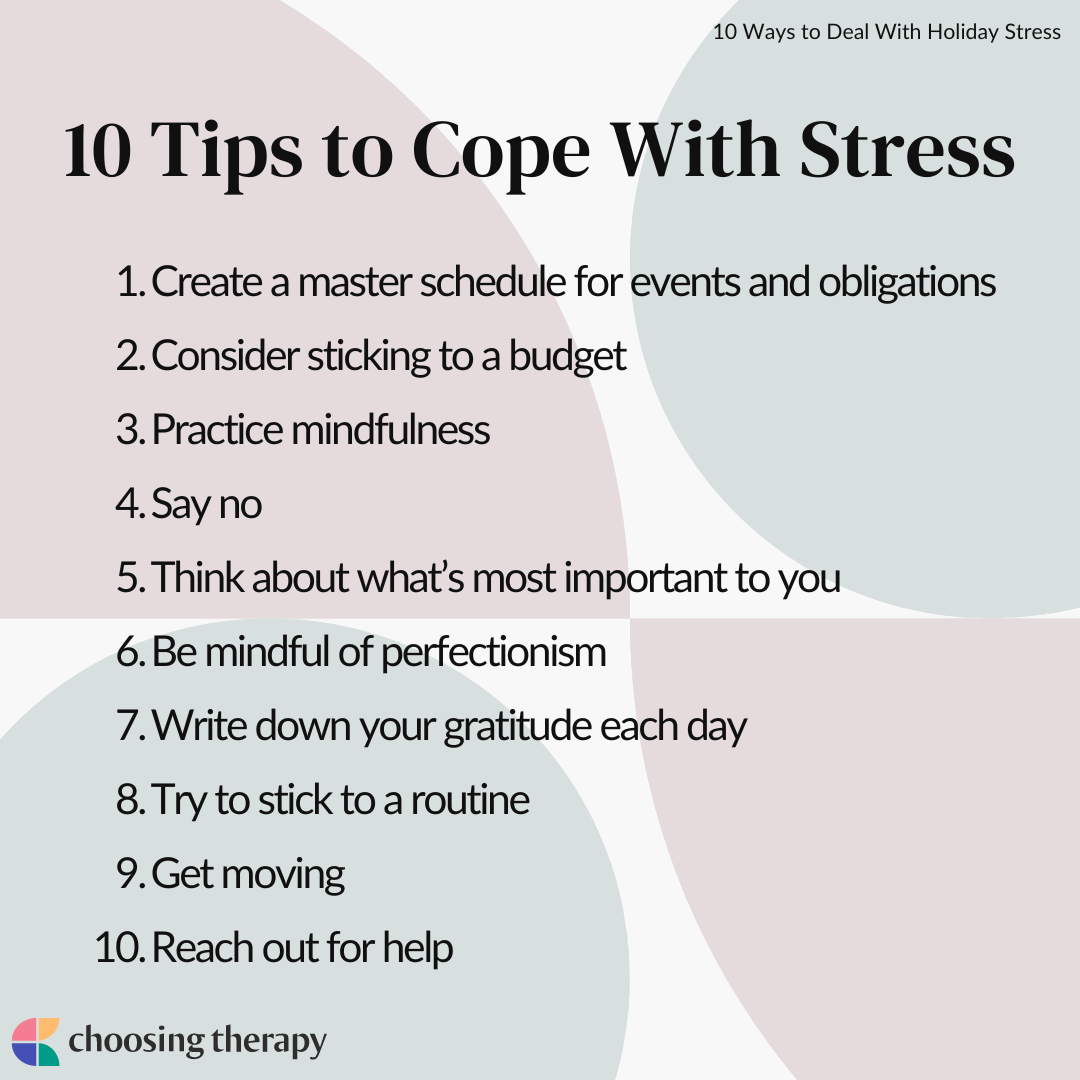The holidays are often depicted as a time for family closeness, cheer, and celebration. But the reality is that many people feel stressed during this time of year. The combination of social events, financial concerns, work demands, and coordinating schedules can be overwhelming. In addition, the holidays can also exacerbate feelings of grief, loneliness, and depression.
Get support before you burn out! BetterHelp has over 20,000 licensed therapists who provide convenient and affordable online therapy. BetterHelp starts at $65 per week. Take a Free Online Assessment and get matched with the right therapist for you.
What Is Holiday Stress?
Holiday stress refers to the specific type of stress that arises in response to the holiday season. It generally arrives just before Thanksgiving, and it can linger after New Year’s Day. Holiday stress can range in severity and type, but the stress often occurs in response to all the expectations that coincide with this time of year.
Holiday stress can come in different forms. Some people feel anxious about hosting various events or spending time with family members. Others feel nervous they won’t be able to afford the gifts they want to buy for their children. People with mental health issues may also note that their symptoms feel more escalated during this time of year, which can magnify stress.
Signs of Holiday Stress
Sometimes holiday stress is insidious. You may not recognize just how overwhelmed, frustrated, or fatigued you feel. But like regular stress, holiday stress can compound over time, and it can lead to serious feelings of despair or hopelessness.1 Unlike regular stress, holiday stress specifically relates to distress that arises in response to the demands and expectations of the holiday season.
Signs of holiday stress include:2
- Increased irritability
- Quick to anger
- Gastrointestinal distress
- Insomnia or other sleep problems
- Appetite changes
- Fatigue/low energy
- Poor concentration
- Racing thoughts
- Headaches
- Neck or back pain
Causes of Holiday Stress
Although the holiday season can be exciting and festive, it also comes with its own set of pressures and demands. Many people can relate to the perils of overcommitting themselves or dealing with complicated family dynamics. Others may find themselves triggered to engage in maladaptive behaviors, including overeating, substance use, or spending too much money.
Common causes for holiday anxiety include:
Too Many Activities
Too many social obligations can quickly feel overwhelming, especially if you’re agreeing to events or obligations that you don’t really want to do. This may magnify feelings of resentment, which can perpetuate more stress. In addition, overextending yourself with too many activities can also make it hard to practice self-care at a time when it’s often crucial.
Overindulgence in Food & Drink
It’s typical for people to eat and drink more alcohol than usual during the holiday season. But this can be a source of stress for people, especially those with histories of disordered eating, eating disorders, or substance use disorders. In addition, nutritional deficiencies or irregular eating can contribute to behavioral symptoms such as fatigue, irritability, and low mood, which may amplify stress.3
Overspending & Breaking Your Budget
Money-related stress is often in full force this time of year. However, people often feel immense pressure to “keep up” and maintain a certain lifestyle that coincides with the holidays. With that, research shows that half of Americans intend to take on debt to pay for the holidays.4 Unfortunately, this means the financial stress often persists long after the festivities end.
Too Much Time With Loved Ones
People with complicated family dynamics may notice that they feel more stressed this time of year if they’re spending more time together. Old dynamics, power differentials, and boundary issues often come into play. And even if you get along relatively well, there can still be a social burnout effect that occurs within families.
Too Little Time With Loved Ones
Spending too little time with family can also be stressful. People often hold onto traditional notions that an enjoyable holiday season entails close familial relationships. When family members live far away or have more estranged relationships, this time of year can trigger complicated feelings of loneliness during the holidays, sadness, or anger, which can also amplify stress.
Seasonal Affective Disorder (SAD)
SAD affects approximately 5% of U.S. adults.5 SAD consists of a combination of depression symptoms, including persistent sadness, loss of interest in usual activities and relationships, feelings of worthlessness or disproportionate guilt, and problems with concentration. These types of symptoms, especially if they are untreated, will often worsen stress.
Mental Health Struggles
People with anxiety or depression often notice that their symptoms worsen during this time of year. This often has to do with the pressure and expectations that come with the holidays. There can also be a desire to want to “mask” how one feels, particularly when engaging in social events. This suppression may exacerbate feelings of isolation and make the stress worse.
Grief and Loss
The holidays can be difficult for people actively experiencing grief. This may occur regardless of when the specific loss happened. There may be uncertainty about how to proceed with certain rituals. Some might want to opt out of particular traditions altogether. This ambiguity can cause stress, especially if family members disagree about how to honor particular parts of the holiday.
Options For Anxiety Treatment Talk Therapy – Get help from a licensed therapist. Betterhelp offers online therapy starting at $65 per week. Free Assessment Psychiatry for Anxiety – Looking for anxiety treatment that prioritizes you? Talkiatry can help. Find an in-network psychiatrist you can see online. Get started with our short assessment. Visit Talkiatry
8 Tips to Cope With Stress
Stress may be inevitable during this time of year. However, it’s still important to identify and implement healthy ways to cope with your stress during the holiday season. Be mindful of your triggers and aim to set realistic expectations for yourself. Remember that no holiday needs to be perfect to be enjoyable, and it can still be okay if things don’t go according to plan.
Tips to cope with holiday stress include:
- Create a master schedule for events and obligations: Writing everything down can help you feel organized and prepared. This mitigates the stress of buying last-minute gifts or realizing that you have an event to attend that seems to have snuck up on you.
- Consider sticking to a budget: If you struggle with overspending, consider making a budget for the holidays (that includes food, decorations, and presents). Even if you don’t stick to it perfectly, having a roadmap may help you feel more grounded.
- Practice mindfulness: Mindfulness can help with holiday stress because it allows you to better focus on the present moment. Practice deep breathing and drawing your attention to the here and now when you feel overwhelmed.
- Say no: It’s okay to say no and turn down social events that you anticipate might drain your energy or exacerbate resentment.
- Think about what’s most important to you: It may be helpful to keep the big picture in mind if you frequently feel anxious about all the little details. Ask yourself what feels most important during the holidays.
- Be mindful of perfectionism: Striving for perfectionism often makes holiday stress worse. Although it may be easier said than done, remember that ‘good enough’ can undoubtedly be ‘good enough!’
- Write down your gratitude each day: Practicing gratitude can help you harness a greater appreciation for your daily life. This may not prevent stress, but it can mitigate its impact on your well-being.
- Try to stick to a routine: As much as possible, aim to ground yourself with some sense of structure each day. This predictability can help you feel more balanced as you move through the ups and downs of the season.
Treatment for Stress
In most cases, holiday stress dissipates once the holiday is over. However, it’s no secret that many people are experiencing extraordinary levels of chronic stress regularly. Research shows that upwards of 57% of Americans feel paralyzed by their own stress.6 If you feel you can’t manage your stress on your own- or your symptoms are negatively affecting your quality of life- professional treatment can help.
Treatment options for chronic stress include:
- Cognitive behavior therapy: CBT for stress could help reduce holiday stress by teaching you how to reframe negative or unrealistic thoughts into more adaptive ones. This, in turn, can help you feel better about navigating the holidays.
- Dialectical behavior therapy: DBT focuses on themes of mindfulness, distress tolerance, emotional regulation, and interpersonal effectiveness. Working on these areas may improve stress symptoms.
- Mindfulness-based cognitive therapy: MBCT blends cognitive principles with mindfulness to better manage stress.
- Acceptance and commitment therapy: ACT primarily integrates behavioral strategies with mindfulness to help people act in ways that best align with their values. This can help you orient your holiday season in a way that brings forth more meaning and purpose to you.
- Group therapy: Group therapy can be beneficial in showing you that you’re not alone with your feelings or difficulties. Groups may focus on pertinent themes of healthy living, coping skills, stress management, and self-esteem.
When to Seek Professional Help
Holiday stress may coexist with other mental health issues, including depression, anxiety, substance use, eating disorders, and more. If you already experience chronic stress, the holidays can make it worse. Seeking professional support can help you feel more empowered during this vulnerable time of year. A therapist can provide you with guidance and coping skills for managing your stress.
When it comes to therapy, the relationship is paramount. Look for a therapist who specializes in stress management- you can use our online therapist directory or an online therapy platform to vet potential candidates. If you’re struggling with stress on top of a mental health disorder, you may want to consider seeking a medication evaluation. Most psychiatrists offer a variety of in-person or online psychiatry options.
In My Experience
Additional Resources
To help our readers take the next step in their mental health journey, Choosing Therapy has partnered with leaders in mental health and wellness. Choosing Therapy is compensated for marketing by the companies included below.
Talk Therapy
Online-Therapy.com – Get support and guidance from a licensed therapist. Online-Therapy.com provides 45 minute weekly video sessions, and unlimited text messaging with your therapist for only $64/week. Get started
Virtual Psychiatry
Hims / Hers If you’re living with anxiety or depression, finding the right medication match may make all the difference. Connect with a licensed healthcare provider in just 12 – 48 hours. Explore FDA-approved treatment options and get free shipping, if prescribed. No insurance required. Get Started
Learn Mindfulness, Meditation, & Relaxation Techniques
Mindfulness.com – Change your life by practicing mindfulness. In a few minutes a day, you can start developing mindfulness and meditation skills. Free Trial
Stress & Burnout Newsletter
A free newsletter from Choosing Therapy for those interested in reducing stress and preventing burnout. Get helpful tips and the latest information. Sign-Up
Choosing Therapy Directory
You can search for therapists by specialty, experience, insurance, or price, and location. Find a therapist today.
*Hims / Hers Disclaimer: Subscription required. After first month, price is $85/month for a monthly subscription or $49/month for a three-month subscription ($123 for first order, $147 billed quarterly thereafter). Subscription automatically renews unless you cancel at least 7 days before renewal is processed.
Online Stress Test A few questions from Talkiatry can help you understand your symptoms and give you a recommendation for what to do next. Best Online Therapy Services There are a number of factors to consider when trying to determine which online therapy platform is going to be the best fit for you. It’s important to be mindful of what each platform costs, the services they provide you with, their providers’ training and level of expertise, and several other important criteria.










